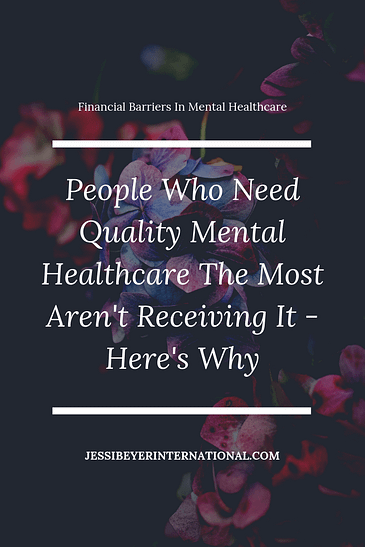The economic disparity that affects access to so many resources unfortunately affects mental healthcare, too. In other words, a lot of people can’t afford therapy – and a lot of therapists are struggling to make enough to live.

In the mental healthcare world, very generally, there are three types of therapists you can go to. You could visit a large practice, a private practice, or a low-cost community clinic. The therapists who have their own private practices are often the most experienced and give out the highest quality of care, but they’re also often the most expensive. The low-cost clinics (or sliding-scale clinics), on the other hand, obviously offer the lowest cost of therapy, but the therapists there are those just starting out in their careers. Therefore, the quality of care is the lowest.
That’s not to bash new therapists – everyone has to start out somewhere. But the majority of the population that goes to these low-cost clinics are the ones who are unemployed or make lower annual salaries. These are also the populations that have the most desperate need in terms of mental healthcare.
Why does that population need mental healthcare the most?
A revolutionary study conducted by the CDC and Kaiser examined the physiological and sociological impacts of childhood trauma on adult life. While an astoundingly large list of correlations were found, the few that I want to focus on here are the correlations that say that those who have childhood trauma are at an increased risk for anxiety, depression and suicide attempts, substance use and abuse, poor professional and academic performance, lower income, and unemployment. Basically, this means that these individuals not only struggle with more mental health concerns than their traumatic pasts, but that they have less economic means in which to work through those struggles. These are the types of people who need top-notch therapy the most, yet they are the ones who are receiving it the least.
It gets even more unfortunate when insurance gets involved. While insurance generally covers mental healthcare (sometimes excluding copays, which can range up to $60 per session), many individuals who are unemployed or employed in low-paying jobs don’t have insurance, or at least don’t have good insurance. Even if they do, healing from trauma can take years. If you run the rough numbers, one session of therapy per week for two years with a $60 copay adds up to $6,240. Someone who’s already struggling to put food on the table for their family isn’t going to bite at spending over 6 grand on therapy, and therefore they’re not receiving the care they need and deserve.
But it’s not the therapists’ fault.
I’m by no means writing this post to hate on the therapists who are providing this care. Amy Sugeno, an ecotherapist from Texas, explained to me that, whether you work in private practice or in a clinic setting, it can often be hard to make a substantial income. In private practice, that difficulty arises from finding enough clients, and in a clinic setting, it stems from not receiving enough of a cut per patient due to all the other costs of running the clinic. Plus, as I said earlier, new therapists have to start their professional careers somewhere, and low-cost clinics are where they often do that.
This is not something that’s an easy fix. You can’t just waltz in and lower the therapists’ rates, or they won’t make enough to feed their families. You can’t expect unemployed individuals to prioritize their own mental healthcare over feeding their children. Access to affordable healthcare – mental healthcare – is a huge issue with no glaringly clear solution, but as May is Mental Health Awareness month and as the US is coming upon another presidential election, I wanted to put these thoughts in your head, as this isn’t something that a lot of people think about. Sure, many of you are probably aware that those with low incomes or no jobs don’t get as good of healthcare as those who make six or seven figures a year, but I doubt you thought about the link between trauma, professional outcomes, and affordable access to therapy. It’s time to start prioritizing our mental health in the healthcare system, and that access should be available for all – not just the wealthy.

